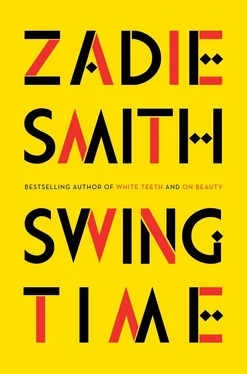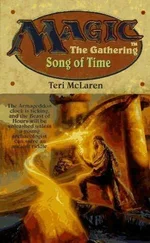• • •
Aimee had thought of this visit as a “fact-finding trip,” but the village committee considered everything a reason for celebration, and the next day, as we finished the school tour and entered the yard we found a drum circle awaiting us under the mango tree, twelve late-middle-aged women with drums between their thighs. Even Fern hadn’t been warned, and Aimee was agitated at this new delay to the schedule, but there was no way to avoid it: this was an ambush. The children streamed out and formed a second, huge circle around their drumming mothers, and we, “the Americans,” were asked to sit in the innermost circle on little chairs taken from the classrooms. The teachers went to get these, and among them, approaching from the very other end of the school, over by Lamin’s maths class, I spotted Lamin and Hawa walking together, carrying four little chairs each. But I did not, when I saw him, feel in any way self-conscious, nor was I ashamed: the events of the night before were so separated from my daytime life that it felt to me that they had happened to someone else, a shadow body who pursued separate aims and could not be forced into the light. I waved to them both — they showed no sign of seeing me. The drumming started. I couldn’t shout over it. I turned back toward the circle and took the seat offered to me, next to Aimee. The women began taking turns in the circle, laying their drum aside to dance in dramatic three-minute bursts, a kind of anti-performance, for despite the brilliance of their footwork, the genius in their hips, they did not turn outwards to their audience but instead remained facing their drumming sisters, their backs to us. As the second woman started, Hawa entered the circle and took the seat next to me that I’d been saving for her, but Lamin only nodded at Aimee before sitting himself on the other side of the circle, as far from her, and I suppose from me, as he could manage. I squeezed Hawa’s hand and offered my congratulations.
“I am very happy. It was not easy for me to be here today but I wanted to see you!”
“Is Bakary with you?”
“No! He thinks I am buying fish in Barra! He does not like dancing like this,” she said and moved her feet a little in echo of the woman stamping away a few yards from us. “But of course I won’t dance myself so no harm is done.”
I squeezed her hand again. There was something wonderful about being near her, she cut every situation to her own dimension, believed she could adapt anything until it suited, even as flexibility fell out of fashion. At the same time a paternalistic — or perhaps I should write here “maternalistic”—impulse surged through me: I kept hold of her hand, too tightly, in the hope, the irrational hope, that it would — like some cheap charm bought off a marabout —confer protection, keep her safe from evil spirits, whose existence in the world I no longer doubted. But when she turned and saw the creases in my forehead, she laughed at me and freed herself, clapping to welcome the arrival of Granger into the circle, who moved round it as if it were a break-dancer’s ring, showing off his heavy-footed moves, to the delight of the drumming mothers. After a suitable minute of reticence, Aimee joined him. To avoid watching her, I looked around the circle at all the adamant, inflexible love, sadly misdirected. I could feel Fern to my right, staring at me. I watched Lamin look up every now and then, his glances directed only at Hawa, her perfect face wrapped up tightly like a present. But in the end I could not evade the image of Aimee, dancing for Lamin, at Lamin, to Lamin. Like someone dancing for a rain that will not fall.
Eight drumming women later, even Mary-Beth had attempted a dance and it was my turn. I had a mother pulling each arm, dragging me up. Aimee had extemporized, Granger had historicized — moonwalk, the robot, the running man — but I still had no ideas about dance, only instincts. I watched them for a minute, the two women, as they danced at me, teasing me, and I listened carefully to the multiple beats, and knew that what they were doing I, too, could do. I stood between them and matched them step for step. The kids went crazy. There were so many voices screaming at me I stopped being able to hear the drums, and the only way I could carry on was to respond to the movements of the women themselves, who never lost the beat, who heard it through everything. Five minutes later I was done and more tired than if I’d run six miles.
I collapsed next to Hawa, and from some fold of her new hijab she produced a small piece of material with which I wiped some of the sweat from my face.
“Why are they saying ‘too bad’? Was I that bad?”
“No! You were so great! They are saying: Toobab —this means—” She traced her hand across the skin of my cheek. “So they are saying: ‘Even though you are a white girl, you dance like you are a black!’ I say it’s true: you and Aimee, both of you — you really dance like you are blacks. It is a big compliment, I would say. I never would have guessed this about you! My, my, you even dance as well as Granger!”
Aimee, overhearing, burst out laughing.
Seven
Some days before Christmas, I was sitting in the London house, at the desk in Aimee’s study, finalizing the list for the New Year Party, when I heard Estelle, somewhere upstairs, she was saying: “Dere, dere.” It was a Sunday, the second-floor office was closed. The children had not yet returned from their new boarding school and Judy and Aimee were in Iceland, for two nights, doing promotion. I had not seen or heard of Estelle since the children left and had presumed — if I even thought of her at all — that her services were no longer required. Now I heard that familiar lilt: “Dere, dere.” I ran up a floor and found her in Kara’s old room, in what we used to call the nursery. She stood by the sash windows, looking out on to the park, in her comfy crocs and a black sweater embroidered with gold thread, like tinsel, and a pair of sensible pleated navy trousers. Her back was to me, but when she heard my tread, she turned round, a swaddled baby in her arms. It was so tightly wrapped it looked unreal, like a prop. I approached quickly, reaching out—“You cyan just come up and touch the baby! Your hands got to be clean!”—and it took a great deal of self-control to take a step away from them both and put my hands behind my back.
“Estelle, whose baby is that?”
The baby yawned. Estelle looked down at it adoringly.
“Adopted tree weeks ago, I believe. You didn’t know? Seem to me everybody know! But she just arrive here last night. Her name is Sankofa — don’t arks me what kind of name is that because I could not tell you. Why anybody wan give a lovely little baby like this a name like that I must say I don’t know. I’m going to call her Sandra until somebody make me stop.”
The same purple, dark, unfocused gaze, sliding off me, fascinated by itself. I could hear in Estelle’s voice the delight she already took in the child — far more, it seemed to me, than she had ever taken in Jay and Kara, whom she had practically raised — and I tried to focus on the tale of this “lucky, lucky little girl” in her arms, rescued from the “back of beyond,” placed “in the lap of luxury.” Better not to wonder how it had possibly been managed: an international adoption in less than a month. I reached out again. My hands were shaking.
“If you wan hol’ her so bad, I’m about to wash her right now: come upstairs with me, you can clean your hands.”
We went to Aimee’s gigantic en suite, which had at some point been quietly made ready for a baby: a set of towels with rabbit ears, baby powders and oils, baby sponges and baby soaps, and half a dozen multicolored plastic ducks lined up along the edge of the bath.
Читать дальше












